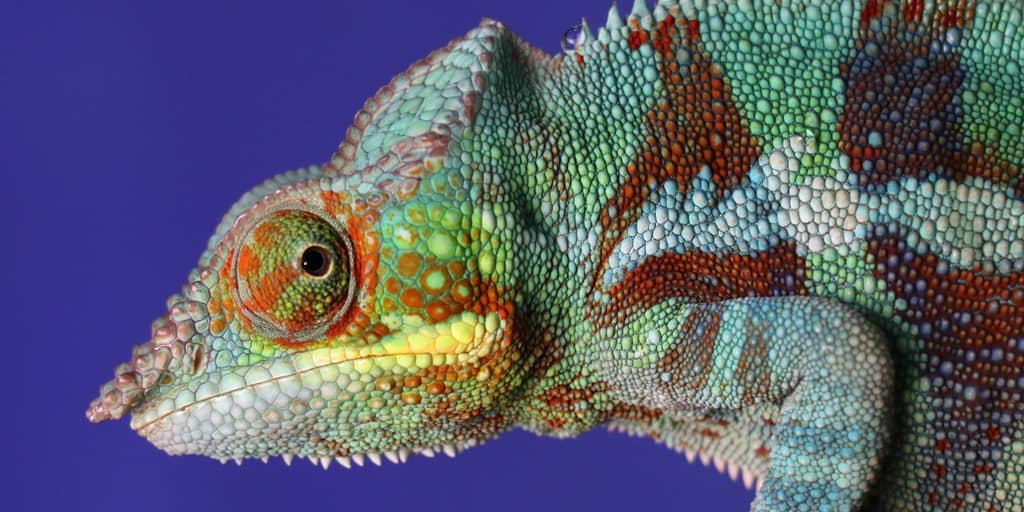The following is an excerpt from A Life in Chameleons by Selby Wynn Schwartz, winner of the 2021 Reflex Press Novella Award.
Il Camaleonte
When Fregoli was born in Rome he was very short. It was 1867.
Rome has always been full of lizards. They are called lucertole, which has within it the word for light, just as lizards themselves do. Mostly they are lucertole campestri, lizards of the country, but they find in Rome the pleasure of sunlight on walls of cities destroyed a thousand years ago. There is nothing like a nice afternoon on the bones of a dead city.
The tail of a chameleon is two-fifths of its body and prehensile, like fingers. Chameleons can see in ultraviolet light. In general, the males are more ornamental. They have excellent eyesight and like to decorate things. One eye can be peering into a darkness so black it dooms all thought to desire while the other eye is looking around quizzically at the flower arrangements. It is not clear why anyone would have thought that a chameleon looked like a lion. But that is what they were called in Greek: lions on the ground.
It took Fregoli until 1889 to acquire the nickname Il Camaleonte. If only he could have rearranged the letters like hats, he could have been a leone, a lion stern and noble. But he was not the type to sit in front of libraries. He was a bright blur. He could lose two-fifths of himself and keep moving.
Eden
Fregoli left Rome for Livorno with one valise. In the valise he carried a moustache, a straw hat, a dress, a gentlemen’s jacket, a lady’s wig, and one pair of black pants so faded that they looked red under the stage lights. He doused them in water to darken them. He stood wet in the wings. He changed colour.
In Livorno the theatre was called Eden. It was a paradise of men with moustaches. But Fregoli, who had a bad cold, could hardly appreciate the other moustaches. He coughed in his dressing room.
Onstage, though, he was three thieves and a policeman. He was everywhere at once, in different hats. He was, in order of appearance, Elvira, her lover Enrico, her father Timoteo, the beautiful French ballerina Mimì, and a cook named Pasquale. There were no entrances and exits. No one ever touched anyone else onstage. There was only a glance, a blush, a bow.
After a show, Fregoli liked to be doubted. People wouldn’t believe he was really Mimì.
IT IS ME ALWAYS ME ONLY ME
Velia
Velia was a girl he met in Livorno. She could sew. He married her.
When Velia was still a girl, Livorno was still a beautiful city. It was the sort of place Byron and Shelley wanted to go on vacation. There was electricity in the street lamps, and you could swim in the sea. The fascists hadn’t occupied the theatres yet.
Shelley, who is well known for drowning in the sea, was trying to get home to Livorno, to Mary Shelley. But she outlived him. She stayed home in Villa Valsovano and wrote while he went sailing.
Fregoli was the kind of man who named his house after his wife. So Velia stayed put on a street in Asti. You always knew where Velia was. Velia had a fountain out front and gardens in back. He built his own private darkroom in Velia. She was, one biographer said, a veritable and proper castle. After a few years he sold Velia and went back to Rome.
Who knows what Velia thought? She had the second floor of the villa all to herself.
The river Tevere
Really all of Rome is a river interrupted by some fountains. As a child Fregoli lived between them. In his neighbourhood there was a great deal of andirivieni, which means coming and going at the same time. The good ones were going to Mass and the wary ones were eying the river, which overran its banks in 1870 and swamped all the fountains.
He was expelled from school and went to work for a watchmaker. But time bored him. When he realized that the sound of watches made time run more slowly, he left the watchmaker and became a waiter. Waiters could slip raw eggs into upturned hats and slyly stick moustaches to the wigs of certain ladies.
Fregoli liked a good tragedy now and then.
A river as grand as the Tevere is like a theatre or a train station. It makes people come and go in crowds, watching. At every moment there is a flow and a flux, arrivals and departures, entrances and exits, astonished surges of time forward to the breach. When Fregoli was younger, he would throw himself off a bridge into the river to see if anyone really loved him.
From A Life in Chameleons by Selby Wynn Schwartz (£10.99).

